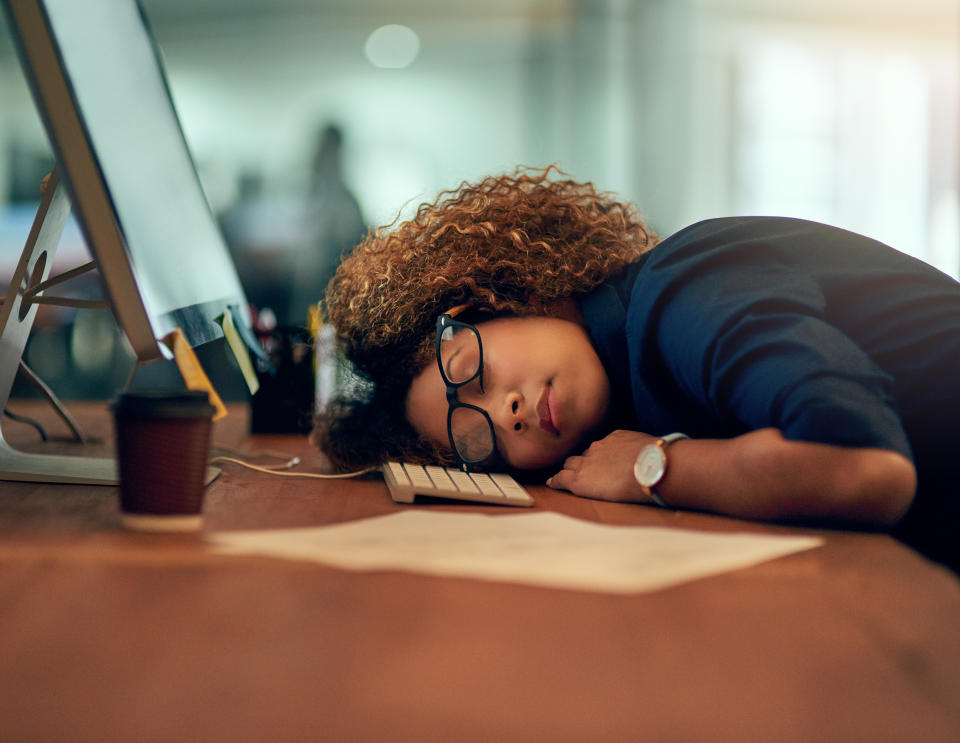There's a nap for that: Why sleeping on the job might not be a bad idea

If you’ve ever dropped off during a particularly dull meeting or sneaked off to the toilet to shut your eyes for a few minutes, you’re not alone. It might be frowned upon, but many of us have had a brief nap at work.
Around 35% of us admit to having napped on the job and got away with it, according to a 2016 survey. More than half of 1,001 Americans admitted to getting shut eye during business hours when polled by the mattress company Amerisleep.
Afternoon siestas are far more common in countries like Spain, Mexico and Brazil, but aren’t the norm in the UK or the US. In fact, the US government went as far as to institute a blanket ban on sleeping in federal government buildings — unless the napper receives expressed permission from an agency official. But is napping something more businesses should be embracing?
A bad night’s sleep can make you feel exhausted, groggy and make getting any work done difficult. Research has shown that trouble sleeping in the long-term can affect work attendance and performance. Lack of sleep affects your mood, your judgment, and your ability to focus, which can lead to errors or poor decision making.
READ MORE: How modern distractions are preventing us from 'deep thinking'
Insomnia can also lead to a lack of productivity, along with absenteeism and errors due to tiredness, which can have a knock-on effect on the economy. Based on a survey of 7,400 individuals, Harvard University estimates sleep deprivation costs companies $2,280 (£1,741) per employee every year.
While sleeping during the day won’t solve insomnia in the long-term, research has shown napping can be effective in reducing some of the day-to-day negative effects of poor sleep. Compared to when no nap is taken, naps improve mood and subjective levels of sleepiness and fatigue, as well as performance on certain tasks such as logical reasoning and reaction time.
Even short naps can give you a boost, studies have suggested. One study, published in the journal Sleep, found that a ten-minute nap resulted in immediate increased alertness and a boost in cognitive performance that could last longer than three hours.
Another study led by researchers at the University of Michigan found that napping can also boost your mood. The study discovered that people were less impulsive and had higher levels of tolerance for frustration after a 60-minute midday nap.
“Our results suggest that napping may be a beneficial intervention for individuals who may be required to remain awake for long periods of time by enhancing the ability to persevere through difficult or frustrating tasks,” said Jennifer Goldschmied, the study's lead author and a doctoral student in the Department of Psychology at the time.
READ MORE: Should we be taking microbreaks to get us through the day?
Napping may also be a cost-efficient and easy strategy to increase workplace safety, the researchers said. Employers who offer nap pods in the workplace — such as Google or Apple — or who offer extended break time may find their employees more productive.
Some countries are embracing sleeping at work. In Japan, it’s commonplace for exhausted workers to nap in the office, on their commute or in cafes. Inemuri — ‘sleeping in public’ — is a sign of someone’s commitment to their work. Some companies are installing “nap rooms” to give people privacy when they want to get some sleep.
This isn’t just because companies are waking up to the benefits of being well-rested, however. Office naps are a reflection of Japan’s tireless work culture and the pressure faced by employees. Nearly one quarter of Japanese companies require staff to work more than 80 hours of overtime a month, research suggests.
READ MORE: Why we need to stop food shaming at work
Japan is also a sleep-deprived nation, with half of Japanese people in their forties getting less than six hours of sleep per night. This combination of long hours and little rest is having a serious impact on people’s health. In the 1970s, people invented the term ‘karoshi’ — which translates to ‘overwork death’ — to describe fatalities as a result of heart attacks, suicides or other health issues from long hours on the job.
Sleeping at work may be taboo, but businesses may do well to embrace the idea of napping during the working day. It needs to be for the right reasons, however. It should be about boosting wellbeing, productivity and cognitive function, rather than encouraging employees to spend even longer at work.

 Yahoo Finance
Yahoo Finance 
